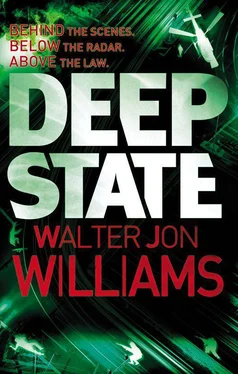Walter Williams - Deep State
Здесь есть возможность читать онлайн «Walter Williams - Deep State» весь текст электронной книги совершенно бесплатно (целиком полную версию без сокращений). В некоторых случаях можно слушать аудио, скачать через торрент в формате fb2 и присутствует краткое содержание. Жанр: Киберпанк, на английском языке. Описание произведения, (предисловие) а так же отзывы посетителей доступны на портале библиотеки ЛибКат.
- Название:Deep State
- Автор:
- Жанр:
- Год:неизвестен
- ISBN:нет данных
- Рейтинг книги:5 / 5. Голосов: 1
-
Избранное:Добавить в избранное
- Отзывы:
-
Ваша оценка:
- 100
- 1
- 2
- 3
- 4
- 5
Deep State: краткое содержание, описание и аннотация
Предлагаем к чтению аннотацию, описание, краткое содержание или предисловие (зависит от того, что написал сам автор книги «Deep State»). Если вы не нашли необходимую информацию о книге — напишите в комментариях, мы постараемся отыскать её.
Deep State — читать онлайн бесплатно полную книгу (весь текст) целиком
Ниже представлен текст книги, разбитый по страницам. Система сохранения места последней прочитанной страницы, позволяет с удобством читать онлайн бесплатно книгу «Deep State», без необходимости каждый раз заново искать на чём Вы остановились. Поставьте закладку, и сможете в любой момент перейти на страницу, на которой закончили чтение.
Интервал:
Закладка:
Lincoln-in his hotel room in Istanbul, the tickets and itinerary for Dagmar’s Bulgaria trip scattered on the table-watched Dagmar’s turmoil with perfect calm.
“Are you serious?” Dagmar asked, staring into Lincoln’s blue eyes. “You want me to astroturf an entire country?”
“A little guidance is all they need,” Lincoln said. “They’ll do all the hard lifting, not us.”
“They’re going to get killed,” Dagmar said. “Look what happened in Iran. In China. They were trying to do exactly this kind of thing and the government answered with bullets.”
Lincoln affected to consider this.
“If we do this right,” he said, “maybe not so many. Maybe none at all.”
“Tens of thousands died in China!”
Lincoln’s lips firmed.
“They didn’t have us to guide them. But if people choose to take that risk-if they think their political freedom is worth risking their lives-then they also deserve our help.”
Dagmar resisted this logic.
“If people got killed,” she said, “it would be my fault.”
“No.” Lincoln was firm. “It would be the fault of the bastards who killed them.”
Dagmar was beginning to suspect that there were a few too many bastards in this picture.
The 0800 briefing began with a buffet of local breads, olives, tomatoes, cucumbers, hard-boiled eggs, and the best watermelon Dagmar had ever tasted in her life. She looked sadly at the buffet and regretted the Weetabix she’d just had for breakfast. Nobody had told her there would be food.
A pack of strangers filled the room, and Dagmar wondered if they’d just come for the buffet before she realized they were all Lincoln’s people from the States. Magnus was tall, well over six feet, and thin-what Dagmar thought of as a Geek, Type One-and was a programmer. He wore a Daffy Duck T-shirt, and his scrawny, hairy legs were revealed by a Utilikilt, a signal garment of the geek.
This was, Dagmar reflected, a British air base, the personnel of which were certain to have a fair number of Scots. She wondered what the Scots would think of Magnus and his Utilikilt and what Magnus would think of the Scots.
Scots, she thought, looked very well in kilts. Or at least those who didn’t knew better than to wear one.
Why was it so different for the Americans?
Lola and Lloyd-whose names, echoing each other, demonstrated the hazards of letting people coordinate their own code names-were well-dressed white people in their early twenties whom Lincoln introduced as interns. Efficient, wavy-haired Lola, businesslike in a gray summer suit, was in charge of the buffet and also of the ID badges that she handed out. The interns were Company, here to learn what Dagmar did, so that they could do it without her later.
Dagmar hoped to hell that they wouldn’t take their skills into the private sector and become her competition. They seemed fearsomely intelligent.
She was just getting acquainted with these when a dignified, well-dressed man entered and was introduced as Alparslan Topal, the observer from the Turkish government-in-exile currently residing in Rome. Dagmar figured he wasn’t using a code name. Topal had a white mustache and exquisite manners and bowed over Dagmar’s hand as he was introduced.
“Pleased to meet you,” Dagmar said.
Topal’s soft eyes looked into hers.
“I hope you will be able to relieve my distressed country,” he said.
Dagmar was a bit startled by this direct appeal.
“I hope I won’t disappoint,” she said.
The last man to arrive used the code name Byron. He was a short, pinch-faced man who wore a tropical shirt and sandals made of auto tires and in no way resembled the poet. Unless, of course, the poet had shaggy hair on the backs of his hands.
“Sorry I’m late,” he told Lincoln. “I was off trying to help out Camera Team C.”
“They were having a problem?”
“Unfortunately, your tech guy didn’t quite understand the fine points of the uplink.”
Lincoln raised his eyebrows. “I hope you straightened him out.”
“I did,” Byron said. He looked over the ops room, at the blank displays, the evil-eye amulets, the oversized portrait of Ataturk.
“Quite a group, is it?” he said.
Inspiration struck Dagmar. She grinned.
“We’re calling it the Lincoln Brigade,” she said.
“As I understand it,” Dagmar said later as she stopped by Lincoln’s office, “the Gray Wolves are your people, right?”
Lincoln adjusted himself in his Aeron chair.
“Not anymore,” he said. “That was an arrangement between our grandfathers and their grandfathers.”
“But the Americans,” Dagmar persisted, “created them, right? Created the Deep State and Counter-Guerilla and Ergenekon and the Gray Wolves?”
She had made a point of doing her homework, looking up decades-old history on Web sites that glowed with speculation and paranoia, all of which suggested that Turkey had been run for seventy-odd years by a creepy little cabal of military men and politicians known euphemistically as the “Deep State.”
Lincoln seemed just a little bit sullen.
“Stalin shifted whole armies to the Turkish border in ’48,” he said. “He demanded that Turkey open the Bosporus. For all anyone knew, he was about to invade.” He shrugged. “So yes, we- our grandfathers-created a lot of things,” he said. “We created stay-behind organizations in every state in Europe, to lead the resistance in case the Russians marched in.”
“Gladio used Nazis,” said Dagmar.
“Not in Turkey,” Lincoln said. “No Nazis there. But yes, Gladio used lots of people. People who were willing to do things to communists, and not all these people were Gandhi.” His look was severe. “But let’s not forget that Stalin wasn’t Gandhi, either. He killed something like fifty million people, half of them his own citizens.”
“Granted,” Dagmar said.
Lincoln’s mouth narrowed into an angry line. “But what we didn’t do,” he said, “was tell the Deep State to take over the heroin traffic running through Asia Minor. And we didn’t tell them to start overthrowing democratic governments once the damn communists went away.”
“Without a Soviet invasion,” Dagmar said, “they were bound to get into mischief. My, uh, grandfather might have foreseen that.”
Lincoln’s expression was savage. “We need to get rid of those dinosaur generals. They’re a fucking embarrassment.”
“Kill the dinosaurs,” Dagmar said. “Check.”
Maybe she could embarrass them to death.
Dagmar had imagined clandestine agents inserted into Anatolia, then working under deep cover to build networks that would strike when the time was right. But Lincoln informed her that the networks already existed.
There were the networks of the political parties and their supporters, all of whom were out of power, out of work, and already organized. There were government workers, annoyed at interference from their new superiors. The religious who wanted to practice their faith free of government harassment. Members of the military and police who had been dismissed as politically unreliable. Students furious at restrictions on academic freedom and rejoicing in their own natural anarchy.
Members of the cultures, and subcultures, spawned by social networks such as Facebook, Ozone, and Taraa.
And there were the poor, especially the urban poor who squatted around the major cities in their improvised, ramshackle communities. The generals were busy placating-or threatening-the rich and powerful, whom they viewed as a greater threat to their legitimacy: they had no time or funds or inclination to raise the hopes of those living in poverty with anything except rhetoric.
All these networks already existed. All that was necessary was to mobilize them and to convince them that they could act with reasonable safety.
Читать дальшеИнтервал:
Закладка:
Похожие книги на «Deep State»
Представляем Вашему вниманию похожие книги на «Deep State» списком для выбора. Мы отобрали схожую по названию и смыслу литературу в надежде предоставить читателям больше вариантов отыскать новые, интересные, ещё непрочитанные произведения.
Обсуждение, отзывы о книге «Deep State» и просто собственные мнения читателей. Оставьте ваши комментарии, напишите, что Вы думаете о произведении, его смысле или главных героях. Укажите что конкретно понравилось, а что нет, и почему Вы так считаете.











